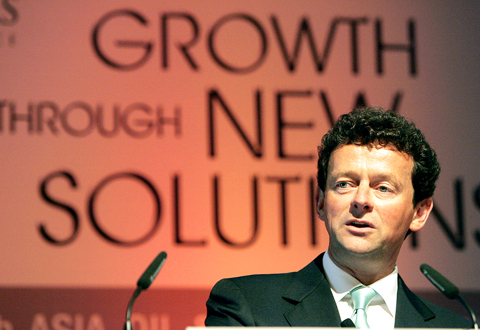Governments should lower trade barriers and cut taxes for the oil and gas industry to boost production and help stabilize global oil prices, the chief of oil giant BP PLC said yesterday.
Tony Hayward, chief executive of Europe’s second-largest oil producer, said the world is not short of oil and gas resources but that high operating costs, rising taxes and lack of access are hampering investment in new production capacity.
The inadequate supply to meet rising demand has led global oil prices to reach records, he said.

PHOTO: AP
“The problem is not below ground; the problem is above ground,” Hayward told a two-day oil and gas conference in Kuala Lumpur.
“The taxes that governments take from the oil and gas industry have continued to increase across the world. I believe this is unsustainable and counterproductive. All it means is that we have less money to invest in new production,” he said.
“Governments must also cooperate to lower trade barriers and tariffs,” he said.
“These are unproductive and run counter to the essential truth that a free and open energy market is just about the best possible guarantee to energy security,” he said.
He criticized government use of subsidies to shield consumers from rising oil prices, saying it was unsustainable as it strained public finances and discouraged sensible fuel efficiency measures.
Crude futures made their biggest single-day leap ever on Friday, soaring nearly US$11 for the day to US$138.54 a barrel but retreated below US$138 in Asian trading yesterday.
Some analysts have predicted that prices could keep climbing amid strong demand in Asia and tight supplies in the Western Hemisphere.
Hayward said there were still 42 years of proven oil reserves and 60 years of natural gas left and vast quantities of other unproven resources and unconventional hydrocarbons such as heavy oil and oil sands.
“We need to invest in new technology, to invest in capability and in alternative energy ... the key to new investment is to make the market work by getting the conditions right,” he said.
The International Energy Agency estimates that investments of US$22 trillion are needed between now and 2030 to meet future energy demand, Hayward said.
BP has raised its capital spending this year to US$22 billion, up nearly 15 percent from last year, to boost production, upgrade its refineries and investing in alternative forms of energy, he said.
Hayward called for increase partnership between private oil companies and national oil firms, which hold 80 percent of world resources.
Hassan Marican, chief executive of Malaysian national oil company Petronas, also urged governments to gradually remove fuel subsidies.
He said the subsidies had caused “unmitigated consumption and market distortions that are unmanageable in the long run.”
Malaysia and India last week became the two latest Asian nations to cut fuel subsidies, sparking protests nationwide as pump prices of gasoline and diesel rose sharply and inflation set to soar.

People can preregister to receive their NT$10,000 (US$325) cash distributed from the central government on Nov. 5 after President William Lai (賴清德) yesterday signed the Special Budget for Strengthening Economic, Social and National Security Resilience, the Executive Yuan told a news conference last night. The special budget, passed by the Legislative Yuan on Friday last week with a cash handout budget of NT$236 billion, was officially submitted to the Executive Yuan and the Presidential Office yesterday afternoon. People can register through the official Web site at https://10000.gov.tw to have the funds deposited into their bank accounts, withdraw the funds at automated teller

PEACE AND STABILITY: Maintaining the cross-strait ‘status quo’ has long been the government’s position, the Ministry of Foreign Affairs said Taiwan is committed to maintaining the cross-strait “status quo” and seeks no escalation of tensions, the Ministry of Foreign Affairs (MOFA) said yesterday, rebutting a Time magazine opinion piece that described President William Lai (賴清德) as a “reckless leader.” The article, titled “The US Must Beware of Taiwan’s Reckless Leader,” was written by Lyle Goldstein, director of the Asia Program at the Washington-based Defense Priorities think tank. Goldstein wrote that Taiwan is “the world’s most dangerous flashpoint” amid ongoing conflicts in the Middle East and Russia’s invasion of Ukraine. He said that the situation in the Taiwan Strait has become less stable

CONCESSION: A Shin Kong official said that the firm was ‘willing to contribute’ to the nation, as the move would enable Nvidia Crop to build its headquarters in Taiwan Shin Kong Life Insurance Co (新光人壽) yesterday said it would relinquish land-use rights, or known as surface rights, for two plots in Taipei’s Beitou District (北投), paving the way for Nvidia Corp to expand its office footprint in Taiwan. The insurer said it made the decision “in the interest of the nation’s greater good” and would not seek compensation from taxpayers for potential future losses, calling the move a gesture to resolve a months-long impasse among the insurer, the Taipei City Government and the US chip giant. “The decision was made on the condition that the Taipei City Government reimburses the related

FRESH LOOK: A committee would gather expert and public input on the themes and visual motifs that would appear on the notes, the central bank governor said The central bank has launched a comprehensive redesign of New Taiwan dollar banknotes to enhance anti-counterfeiting measures, improve accessibility and align the bills with global sustainability standards, Governor Yang Chin-long (楊金龍) told a meeting of the legislature’s Finance Committee yesterday. The overhaul would affect all five denominations — NT$100, NT$200, NT$500, NT$1,000 and NT$2,000 notes — but not coins, Yang said. It would be the first major update to the banknotes in 24 years, as the current series, introduced in 2001, has remained in circulation amid rapid advances in printing technology and security standards. “Updating the notes is essential to safeguard the integrity